Gender
“I do think that humanity is moving forward even when it looks like we're moving backwards. If you take a step back and look at the bigger picture, we are progressing.”
For Hilde Ousland Vandeskog, PhD candidate at Oslo University, and gender researcher from Norway, one of the most egalitarian countries in Europe, achieving gender justice needs to be a community effort involving everyone.
She found out about the Abatangamuco’s during her research, a group of men who are carrying out a revolution against gender-based violence through theatre in Burundi.
This is Cry Like A Boy, Euronews’ first podcast production, in partnership with Africanews, which aims to promote a cross-border discussion on gender roles, from the perspective of five African countries (Burundi, Senegal, Lesotho, Guinea and Liberia). The four journalists behind the project work with a network of local correspondents in the countries covered by the project, as well as Africanews journalists.
In this episode, we resume the debate between Grace-Françoise and Hilde, hosted by Khopotso Bodibe, a South African radio journalist and activist specialising in health and gender issues in Johannesburg. What do they think of these men who stopped abusing their wives? Is their formula really working in Burundi? And can it be exported?
In the French version of this podcast (Dans la Tête des Hommes), the guests of our roundtable are Gilles Lazimi, a French doctor who campaigns against gender-based violence, and Christine Ntahe, known as Mamam Dimanche, who specialises in healing domestic and inter-ethnic conflicts in Burundi.
Please do not hesitate to listen and subscribe to the podcast on euronews.com or Castbox, Spotify, Apple, Google, Deezer.
TRANSCRIPT
THE ABATANGAMUCO IN BURUNDI: THE SOLUTIONS - EPISODE 4
Khopotso Bodibe: Welcome to Cry Like a Boy, a Euronews original series and podcast that explores how the pressure to be a man can harm families and societies. Stay with us as we travel across the African continent to meet men who defy centuries-old stereotypes. I am Khopotso Bodibe with you from Johannesburg in South Africa. In this follow up conversation with our European gender expert, Hilde Vandeskog and Burundi-based activist Grace-Francoise Nibizi we will continue exploring the Abatangamuco, a community group in Burundi comprising of men who are carrying out a revolution against gender-based violence through theatre, changing established views and mentalities and fighting against domestic violence. We urge you to listen back to the first half of this conversation via our website.
Now, there is a growing school of thought that the attainment of gender equality requires the engagement of men and boys, the main perpetrators of gender injustice and upholders of patriarchal norms, as I have alluded to earlier. What is your view on this? And how can the involvement of men and boys, as we've seen with the Abatangamuco, be scaled up? I'll actually pose this question to you first, Grace-Francoise.
Grace-Francoise Nibizi: In the past year, we have realised that all activities we've been doing, we never really engaged with men and boys. It's like we were just talking amongst us, amongst women, we're trying to do something to empower women and girls so that they can at least be empowered. I mean, financially and socially. But it's very important to even educate boys and women and men, because sometimes what they are doing is what they have learnt.
That's how they grew up. So it's very important to educate them and tell them that although our culture sees this and this, and although they have been socialised, consider that women have to be passive, women have to be submissive, women have to be dependent on men, women are powerless, women are weak, all those, they have to be educated and tell them to show them that it's not true. And that was through education, through sensitization and through engaging men and boys, so that they can have another view showing them that women are not powerless, women are powerful.
And that's why I kept on saying the job Abatangamuco are really doing is fantastic, is excellent. Unfortunately, they are really not supported so that they can cover the whole country, cover the whole provinces. I wish even their model could be exported to other countries because as I said in the beginning, it is the same all over African countries, it is the same in Europe, it's the same all over the world.
Khopotso Bodibe: Thank you so much for that response. Hilde, your response to the same question.
Hilde Ousland Vandeskog: So in terms of engaging boys and men? Yes, I think I do think that's a crucial aspect of achieving gender justice because indeed we need a systematic change like any systematic change needs to involve the whole community. And a whole community consists of men, women, girls, boys and people who don't identify as either gender and to achieve gender justice needs to be a community effort involving everyone.
And certainly, you know, to have programmes and campaigns that particularly talk to men and boys to challenge them, but also to take their challenges seriously. Because it's not like, as this Cry Like a Boy series is showing us as well, masculinity is harmful, not just to women. Toxic masculinity is harmful to boys and men as well.
I'll give an example. The Norwegian police had this campaign a year or two ago that I think was really interesting. They took this concept, in Norwegian, it's called kjernekar, which basically translates to "a really properly good guy". They made this big campaign spread over buses and everything, basically saying that a kjernekar a good guy, is someone who will stop his friends if they are stepping over the line with a girl, if they are harassing someone if they are going home with or taking home someone who is too drunk to consent to any kind of sex, you know.
Basically, to try to play on that notion that guys want to be good guys, to make guys actually check each other's tendencies, to act on the more toxic and destructive aspects of expectations to masculinity. And I think that was a really interesting campaign. And I think it's a good way forward.
Khopotso Bodibe: Françoise, is the word getting out about toxic masculinities in Burundi? Are people getting information and is there sufficient information about it?
Grace-Francoise Nibizi: During this week, I posted on my WhatsApp status, actually, I wanted to know exactly whether the Burundians know, especially Burundian men and boys, know anything about toxic masculinity. First of all, I wanted to know if there is a word in Kirundi which says about toxic masculinity.
And I was very shocked and amused by the questions I got. I got like 50 different answers concerning the toxic masculinity world itself. But in the end, I retained two words. One is akanyarigabo in Kirundi means "a man who is really boasting". It doesn't really explain the toxic masculinity. It explains how a man or a boy has to stand on himself, whether he's doing bad or good. He has to stand up on his decisions.
And that showed me that the toxic masculinity is not really in their minds and in their head and heart. And which means it's something which has to be really talked about more, educate men and boys. Actually, the whole community needs to be educated so that they can see that that toxic masculinity is really very bad, it's very harmful, and it has got a very direct consequence, whether to women themselves and to the whole family and to the whole country. So toxic masculinity in Burundi has to be really talked more about.
It's good that we have that group of people who have realised that some of our norms in our culture are really very harmful. And I believe it's going to take a long time to change because as I said in the beginning, it's something which is rooted in our culture. But I believe it's going to be successful at the end.
Khopotso Bodibe: Hilde. Can you tell us about your experience working with the Abatangamuco as a European woman? What were your observations? Talk to us about that.
Hilde Ousland Vandeskog: So I travelled to Burundi. It was the first time in my life that I was there something like nine years ago, and travelling out in the countryside and meeting these men. I remember my translator who had helped me set up the interviews. He told me that many of the men wanted to have the interviews with their wife by their side. And I remember thinking, I don't think that's a good idea because, you know, he might not speak as freely and she will, you know, because I was expecting her to just back him up and be supportive and be difficult to get any critical questions.
What I did get was this really, really interesting dynamic where these men would talk sometimes with a bit of humour and also always with loads of kind of regret and self-reflection about the way they had mistreated their wife who was sitting next to them.
And she would be kind of supplementing his narrative and correcting him, which he would just completely accept. And I realised that this was really not just a story about the man's change, but a story also about the woman's change and the couple's change and the change of a whole family from like one that was dominated by a very toxic type of masculinity to one where the man would, you know, start to accept that he should listen to his wife, collaborate with his wife, do some of the wife's work, but also that the wife would accept that, you know, her man would do women's work sometimes and she would be expected to, you know, step out of the expectations of femininity.
So it was interesting how it was really a journey for both of them. That was one of my main observations, how interesting that was and how that brought the family closer together. And another thing was just the passion that these men had for spreading the word and convincing, you know, through art theatre, discussions to convince the other men in their communities that they needed to make these changes as well in order to be happy. Not just because it was right, not just because there was some kind of moral imperative, but, you know, because it was good for them, because it was good for the community because they would feel better. They would do better by stepping out of that toxic masculinity.
And that was fascinating to me and I'm thrilled now because it's been a while since I did this research and I've been thrilled to listen to the podcasts that you guys have been doing and to see that the movement is still thriving and to see many of the men that I met to see how sustainable it has proven to be, I think. Is this fantastic?
Khopotso Bodibe: Hilde, how do you see the next steps for the status of women in the world? Are you pessimistic? Are you optimistic? And why if you're pessimistic or optimistic.
Hilde Ousland Vandeskog: I must say fundamentally an optimist. I do think that humanity is moving forward even when it looks like we're moving backwards. If you take a step back and look at the bigger picture, we are progressing. It's getting better in Europe and the US, in Western countries the Metoo movement, I think, was a watershed. And it showed how there was even in a country like Norway, where we do tend to get a little complacent and think that, well, you know, we've achieved gender justice, we're good. You know, we're so equal. There was this conversation to be had about the really, really toxic, hidden impacts of gender roles and gender expectations and gender hierarchy in the workplace, in cultural life, so on and so forth.
And we were able to have that conversation. It just brought up this shift in the public perception in terms of, you know, taking women seriously and taking women's experiences seriously. And of course, you get backlashes. Of course, you get those who don't like phrases like tax toxic masculinity because they see that as kind of like calling all masculinity toxic. And again, we will always have these discussions. We will always have the backlashes. We will always have pockets of progress and pockets of regression.
But I think overall, I am optimistic. I see more awareness, more kinds of sophisticated understandings of the negative impact of gender inequality, more willingness to see the hidden impact of gender inequality and the hidden inequalities themselves. So, yeah, it will go up and down, back and forth, backlashes, progress. But in the grand scheme of things, I'm an optimist.
Khopotso Bodibe: Can I ask that same question of you as well, Françoise?
Grace-Francoise Nibizi: Yeah, of course. I'm optimistic. Very hopeful, because I can see what the Abatangamuco are doing. And, as I mentioned, it's going to take a long time. But at least it started. It started. And what the Abatangamuco are trying to do is to change the way of living. And changing a way of living in a community, it can't just happen in one year or two years.
So I'm very hopeful that in the end, even though it's going to take a long time, it's going to happen. And for the moment, I even know that not all men that change their ways after being or receiving messages or testimonies from the Abatangamuco change.
I know it's a long process. In order to be an Abatangamuco, a man has to show various commitments and expose himself as somebody who can be a peer. So it's a long process. And Abatangamuco principles and values. Somehow it's very hard for young men and boys because in the beginning they are used to something else. So it won't happen in one day, in one year or five years. But I'm very hopeful that in the end it's going to change. It's going to change and we're going to have that justice, gender justice we are fighting for. Thank you.
Khopotso Bodibe: Thank you so much to the both of you. Thank you so much for your time. It's been an absolute learning experience to be speaking with you.
This show has been produced with me, Khopotso Bodibe, Clarice Shaka in Burundi, Marta Rodríguez-Martinez, Lillo Montalto-Monella and Naira Davlashyan in Lyon. Special thanks go to Lory Martinez and Studio Ochenta for helping us produce this podcast under special conditions.
I would like to thank our guests Grace-Francoise Nibizi and Hilde Ousland Vandeskog. For more information on Cry Like a Boy, a Euronews original series and podcast, go to Euronews.com to find opinion pieces, videos and articles on the topic.
Follow us on Twitter @Euronews is our Twitter handle and we are @Euronews.TV on Instagram. Also, share with us your own stories of how you changed and challenged your view on what it means to be a man using hashtag #crylikeaboy. If you a French speaker, this podcast is also available in French "Dans la tête des hommes" is the name of the podcast series.



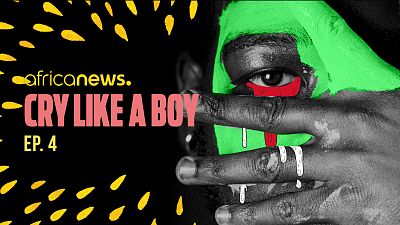



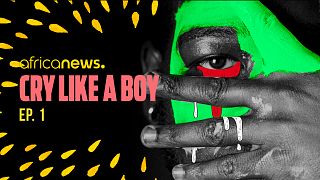
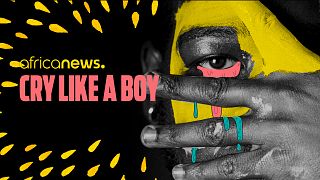


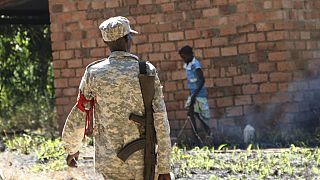
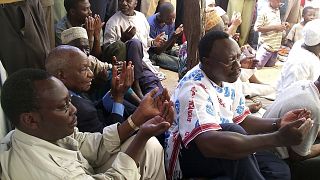
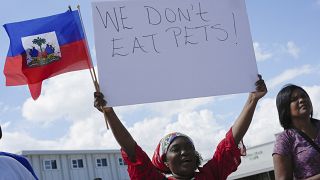
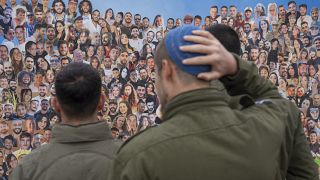
01:37
Record participation at 24th Sofi Great Ethiopian Run
11:05
Africa's hight cost of climate change [Business Africa]
01:17
COP29 finance talks lag as the summit reaches its halfway mark
01:38
COP29: What next for Africa's energy transition?
01:00
Civil society takes center stage at Brazil’s G20 social summit
01:22
Cases of new mpox strain more than double among children in DR Congo and Burundi